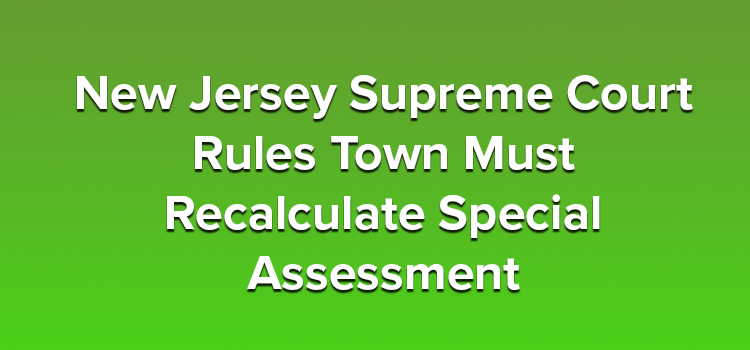In Carol Crispino v. Township of Sparta (A-16-19/083171) (Decided July 22, 2020), the Supreme Court of New Jersey struck a municipal resolution imposing a special assessment to fund a private dam restoration project. According to the court, the Township arbitrarily applied the special assessment to plaintiffs’ properties because the expert report relied on by the Township did not apply any reliable methodology to assure that the assessment allocating the costs among the properties was “in proportion to and not in excess of the benefits conferred,” as required by N.J.S.A. 58:4-12(d)(1) and other statutes.

Facts of Crispino v. Township of Sparta
Defendant Township of Sparta (Township) passed a resolution imposing a special assessment on fifty-eight properties to recoup public funds expended in the rehabilitation of a private dam owned by the Glen Lake Beach Club, Inc. (Beach Club). Under the Beach Club’s bylaws, the owners of the fifty-eight properties — all within close proximity to Glen Lake — are eligible to join the Beach Club and enjoy its amenities.
Eight of those property owners (plaintiffs) filed an action in lieu of prerogative writs challenging the validity of the special assessment. Plaintiffs are not members of the Beach Club, and they do not own properties either on the lake or with a view of the lake. They claimed that the special assessment, which allocates the costs for the restoration of the dam among the fifty-eight properties, was not in proportion to any benefit they received, thus violating N.J.S.A. 58:4-12(d)(1). Plaintiffs attacked the expert appraiser’s report relied on by the Township, asserting that it offered no methodology or justification for imposition of the assessment on their properties and therefore it constituted a “net opinion.”
The trial court agreed. The court determined that the expert report did not follow any discernible methodology in allocating the cost for the dam restoration among plaintiffs’ properties and therefore declared the resolution imposing the special assessment arbitrary and void. The Appellate Division reversed, finding within the four corners of the expert report a sufficient basis to justify the special assessment on plaintiffs’ properties, and reinstated the resolution.
NJ Supreme Court Decision in Crispino v. Township of Sparta
The New Jersey Supreme Court reversed. “Although plaintiffs’ properties may have received a benefit from the dam restoration project, the expert report relied on by the Township did not apply any reliable methodology to assure that the assessment allocating the costs among the properties was ‘in proportion to and not in excess of the benefits conferred,’ as required by N.J.S.A. 58:4-12(d)(1) and other statutes,” Justice Barry Albin wrote on behalf of the Court.
“The Legislature has delegated to municipalities the power to impose special assessments on property owners to fund certain improvements. That power, however, may not be arbitrarily exercised,” Justice Albin explained. “The presumption of validity accorded to a municipal law cannot shield a special assessment based on a methodology that lacks any indicia of reliability. Accordingly, we are constrained to invalidate Sparta Township Resolution 6-1, which imposes a special assessment on plaintiffs’ properties to recoup the costs of the dam restoration project.”
In reaching its decision, the court emphasized that the justification for any special assessment levied for the purpose of financing a local improvement, N.J.S.A. 40:56-27, or an improvement to a privately owned dam, N.J.S.A. 58:4-12, is that the assessed property has received a benefit from the improvement. It further noted that under relevant case law, the benefit to the assessed property must be certain rather than speculative, although it may arise in the future, and the benefit to the specific property must be substantially greater than to the public in general. In addition, an assessment must be proportionate to the benefit conferred on the property. The New Jersey Supreme Court went on to conclude that the Holzhauer report, which was adopted by the Assessment Commission and the Township Council, did not comport with the statutory mandates and the governing case law. “The Holzhauer report, on which the Township relies, does not set forth any methodology or any sound analysis to justify the special assessment imposed on plaintiffs’ properties,” Justice Albin wrote. “We therefore conclude that the presumption of validity accorded to Resolution 6-1 has been overcome by clear and convincing evidence.”
